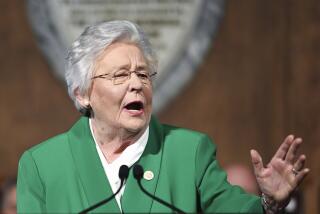U.S. Education Practices Seen as ‘Tyrannical’
- Share via
WASHINGTON — Traditional methods of training teachers, testing students and selecting textbooks are so flawed they may derail creative efforts to improve learning, a report said Sunday.
Lynne V. Cheney, chairwoman of the National Endowment for the Humanities, used a mandated congressional report to criticize basic U.S. educational practices.
Cheney called the practices “tyrannical machines,” a phrase coined by philosopher William James to describe methods that become both counterproductive and resistant to change once established on a large scale.
The report cited the Scholastic Aptitude Test as “an almost classic example” of a “tyrannical machine.”
Cheney also attacked school textbook selection committees that choose material without reading them, college education programs in which teachers spend little time studying what they eventually will teach and university systems that value research more than teaching.
“Tyrannical machines dominate American education and have contributed to its failures,” Cheney said in the report.
“When there are alternative ways to become a teacher or to choose textbooks or to assess students . . . it is more difficult for outmoded and unsatisfactory methods to dominate,” she said.
Deputy Education Secretary Ted Sanders applauded the report, saying: “We need a revolution in teaching and learning.”
Cheney said that the SAT tries to avoid testing what students have learned about subjects such as history and literature.
She said that an alternative would be to expand the use of the National Assessment of Educational Progress, saying it was the sole assessment tool that is both nationally representative and comprehensive in calculating what America’s students know and can do in various subject areas.
More to Read
Sign up for Essential California
The most important California stories and recommendations in your inbox every morning.
You may occasionally receive promotional content from the Los Angeles Times.











